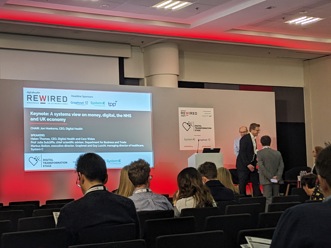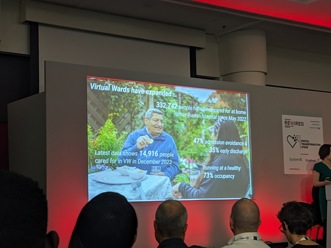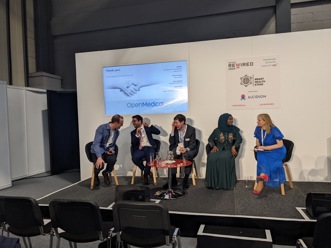
Digital Maturity and Integrated Care
The keynote Session, chaired by Jon Hoeksma, CEO of Digital Health, along with speakers Guy Lucchi, Markus Bolton, Helen Thomas, and Prof Julia Sutcliffe, kicked off the event with a deep focus on digital maturity and the importance of integrated care.
The session emphasised the pivotal role of Electronic Patient Records (EPRs) in supporting a joined-up care model. Each speaker highlighted how comprehensive governance, workforce empowerment, and the sharing of population health data are intrinsic to promoting better collaboration between healthcare providers.
Industry challenges like data silos, funding gaps, and digital exclusion were also concerns the panel shared; inhibiting our ability to bring about the vital changes required to improve health outcomes. The panel agreed that prevention and a move towards more proactive models of care need to be the focus.
"It's not just carrying on with what we're doing now; it's a fundamental shift in how we care for patients. If we don't change, we'll be in big trouble," said Markus Bolton, executive director of Graphnet.

Virtual Wards and Remote Monitoring
Virtual Wards and their impact on healthcare delivery was another hot subject. During the Inside Track session, Dr Amanda Begley, Tara Donnelly, and Umesh Gadhvi shared insights into their virtual wards' inner workings and outcomes.
According to Begley, virtual wards in South London yield an average of £2.80 in savings for every £1 invested, while hospitals have seen a 50% drop in admittances - equating to over 4,000 patients.
Umesh Gadhvi, who is the Digital Transformation Office for North London Foundation Trust (NELFT), praised the dynamic design of Access Rio EPR as an integrated solution and talked about its impact on helping his Trust and speed up discharge and how it's enabled his clinicians to deliver proactive care and respond to patients' needs more efficiently.
"We truly believe in total integration end to end. Our digital strategy is all about listening and engagement, and no solution works without integration," said Umesh.
He gave a fantastic visual representation of the process map his Trust is working against for virtual wards and how having the right support mechanisms in place has made a significant difference to patients, staff and vendors. "It's key that you have a collaboration mentality. The ability to know where a patient is within the journey is key."
The Smart Health Stage also gave us an overview of the shared challenges faced by other UK Trusts using a remote care model, with Michael Crooks, Dr Paul Hudson, and Dr Gang Xu presenting key insights from their respective organisations. Like London, over a 12-month period, Hull University NHS Trust also saw a 50% reduction in ED admissions due to patients using technology-enabled care (TEC) support to self-manage their health.
The Dudley Group NHS Foundation Trust, which was the first to pilot-launch the UK's first Nutritional Virtual Ward program at Hospital, shared objective data showing a saving of 261 bed days since its launch in January 2023.
The Trust also launched the first paediatric ward in January 2022. Other Trusts, including Dorset and Blackpool, followed suit and have successfully treated over 6,400 children between them since July 2022-2023.

AI-Driven Workflows and Processes
The session on intelligent workflows discussed the potential of AI-driven processes in healthcare and the considerable impact these tools and technologies have had on bolstering operational efficiencies, reducing appointment backlog and DNA (did not attend) rates, driving patient engagement, and supporting a user-centric approach to care.
Jacob Koris gave a compelling talk on the role of "process mining" in healthcare, i.e., extracting time stamp data from IT systems to determine what processes take the longest, e.g. when a patient is prescribed vs. when they receive their medication.
He also explained how this technique can be applied to admin tasks and supply chains, but that the real benefit comes from the ability to map out pathways and reduce the need to look through hundreds of notes to know where a patient is in their journey. "It's like turning the lights on and keeping them on," said Koris.
Tom Newman's talk on generative AI was particularly thought-provoking. He reminds us that while AI indeed offers some powerful ways to enhance patient outcomes and operational efficiency, these tools alone cannot solve all our problems, and we must continue to personally design and ethically align solutions with users.
Jessica Morley of Yale Digital Ethics Centre also touched on the topic of prioritising personalisation when employing AI during the keynote session on Wednesday. In reference to the ethical governance of healthcare technology and the unregulated solutions in the market, she noted that there is a big difference between "what could be done with technology and what should be done".
Collaboration and Innovation
Throughout the event, collaboration and innovation emerged as overarching themes driving digital transformation in healthcare. Industry leaders and practitioners discussed the importance of collaborative partnerships, interdisciplinary approaches, and knowledge sharing in addressing complex healthcare challenges.
They highlighted the role of digital technologies, predictive analytics, and data-driven insights in fostering innovation and driving positive outcomes for patients, providers, and healthcare systems.
NHS Confederation CEO Matthew Taylor was one of the panellists for the keynote session on 'Addressing the Nation's Priorities and Funding'. He believes engaging the public in healthcare solution creation is one of the best ways we can innovate new models of care and better understand population models. He also suggests integrating the NHS app into the school curriculum to lessen future demand for services and calls on Trusts at all tiers to personalise technology solutions according to their organisation's specific needs.
During the Digital Transformation talk on Tuesday, Flavia Rovis stressed the importance of collaborative work between organisations for digital projects to thrive. Jane Eddleston's story of transformations showed us that teaming up with tech experts is key to making things happen smoothly. At the same time, Tim Corbett's learnings from New Zealand's healthcare landscape explained that rather than creating a system and trying to adapt to the wider audience, designing technology that works for everyone is more effective.
These sessions did a fantastic job of cementing the point that when everyone in healthcare collaborates, we can drive transformative change.

Final Thoughts
Rewired 2024 provided a platform to share fresh ideas, encouraging discussion and teamwork among healthcare providers, health tech companies and professionals. The path toward a better healthcare landscape is one marked by increased efficiency, better patient outcomes, and digital transformation. Events like Rewired are leading the way toward this ideal future, and we can't wait for the new ideas, insights, and people we'll get to engage with next year.

